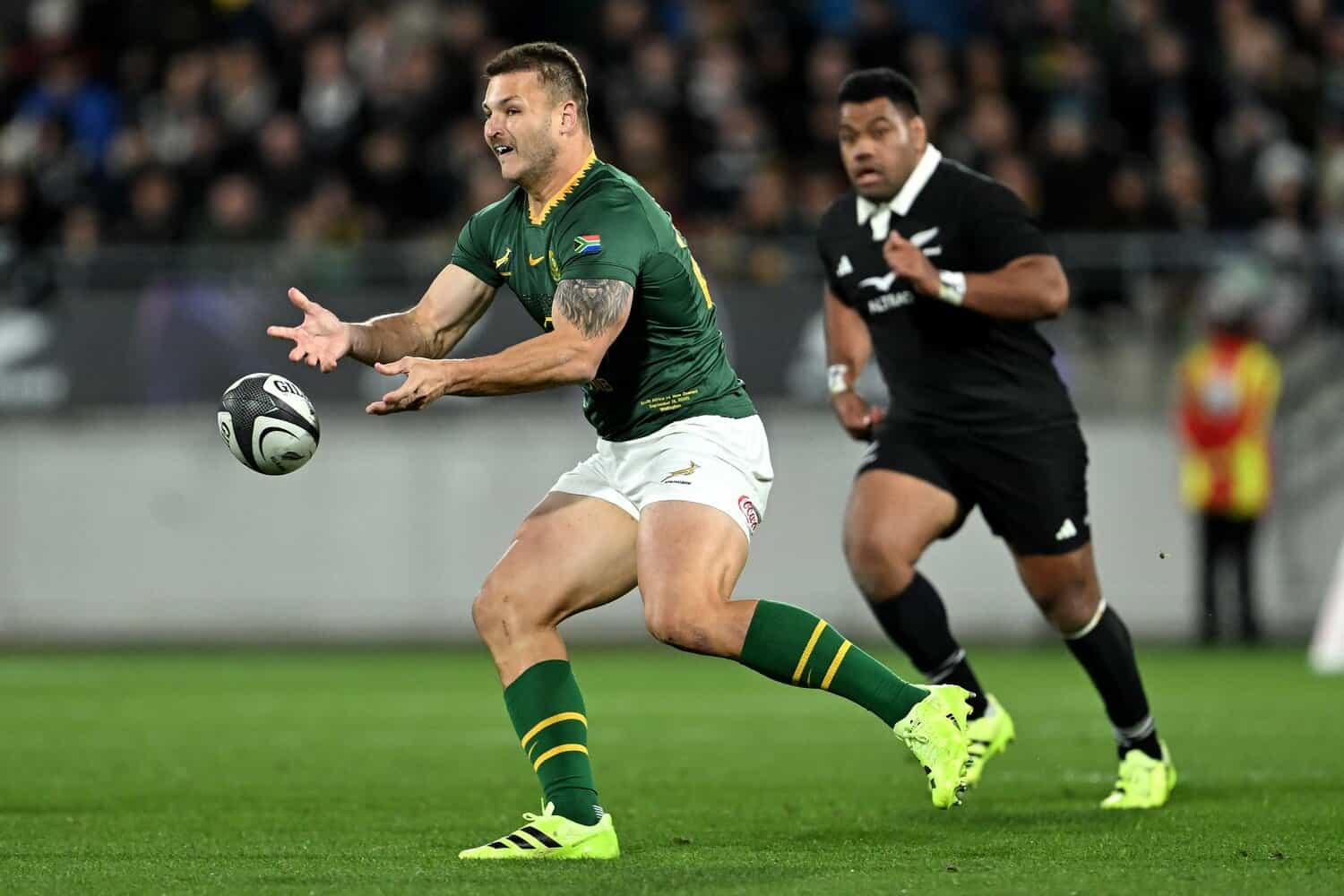Everything about the build-up to Saturday at Kings Park feels like knockout rugby, and that is fitting for a contest framed by jeopardy and pride. The stakes are simple, win and stay alive in the Rugby Championship race, lose and tumble out of contention before Twickenham next week. In that context, Springboks vs Argentina 2025 arrives less like a round-robin fixture and more like a defining examination of nerve and detail.
South Africa are fresh from a record hammering of the All Blacks in Wellington, yet the memory of that 43-10 eruption has been tempered by a week of humility and hard lessons. André Esterhuizen, the hulking hybrid who scored the final try that night, put it plainly. The Boks saw what is possible when execution meets work rate, but they also saw a first half littered with errors, and the message from camp is consistency, not complacency.
Argentina travel with the bite to match their bark. They beat New Zealand and Australia already this season, and last year they scalped all three rivals in the competition. Rassie Erasmus referenced that form repeatedly this week, noting a Pumas side that is fast, balanced and guided shrewdly by Felipe Contepomi. His selection and comments reveal a coach seeking a careful balance, innovation where it helps, pragmatism where it matters most.
Why Durban feels like a semi-final
The table is a traffic jam. Australia lead with 11 points, South Africa and New Zealand sit on 10, and Argentina are on nine. Erasmus has said the Springboks will treat this like a proper Test, not a bonus-point hunt, because the margins are too slim to gamble. Expect a Bok performance shaped by risk management, territory and set-piece pressure, especially given what the Pumas bring in contact.
Kick-off is 5.10pm at Kings Park, a venue that demands composure in the wind and a clinical aerial game. Esterhuizen highlighted the aerial exchanges and ball security as decisive themes, and in a match where both teams defend ferociously, the ability to kick contestably and exit cleanly could separate the sides. The Boks have emphasized that the team who looks after the ball and takes chances, then wins the battle in the air, will probably prevail.
Rassie Erasmus balances innovation and result
Erasmus made only two injury-enforced changes to his starting XV, a nod to the value of continuity after Wellington. Eben Etzebeth steps in for the injured Lood de Jager at lock, and Damian Willemse shifts to fullback to replace the injured Aphelele Fassi. That opens the door for Damian de Allende to return at inside centre, where he partners the instinctive Canan Moodie in a rare midfield combination.
Erasmus did not hide his curiosity about different combinations. He said that if the game allows, he might move players around to test options. He even floated a scenario where Manie Libbok gets a run, Sacha Feinberg-Mngomezulu moves to 15, Willemse back to 12, and André Esterhuizen to loose forward. The caveat was clear though, a win remains the first priority in a contest the Boks will respect as a high-stakes examination.
Argentina selection signals intent up front
Felipe Contepomi has reinforced his pack for the Durban collision. Pablo Matera returns at flank, while Franco Molina and Lucas Paulos start at lock. That means Guido Petti and Pedro Rubiolo shift to the bench, and Juan Martin Gonzalez also features among replacements in a six-two split. These are the kind of moves that speak to trench warfare at scrum and maul, and to a plan that aims to squeeze South Africa at source.
The backline stability is telling. Santiago Carreras keeps the 10 jersey after commanding outings in Australia. He leads the Championship with 47 points, including a perfect eight-from-eight goal-kicking night in Sydney in the 28-26 victory. Tomas Albornoz returns from a finger dislocation to the bench, and his presence adds insurance and edge for the final quarter. The spine of this team, Julian Montoya’s leadership and craft, Carreras’ boot and the pace out wide, gives Argentina balance and bite.
The scrum question and a South African obsession
South African rugby has heard the chatter about scrum rewards shifting. Law tweaks removed the option of choosing a scrum from a free kick and introduced a 30-second shot clock for setting scrums, and the scrumhalf is protected from being tackled within a metre at the base. There is no law that says dominant scrums should be rewarded less, yet some coaches have sensed a trend where collapses do not always translate to penalties.
Tighthead Wilco Louw, who is due for his seventh Test of the year and 23rd overall cap, offered the front-row view. The referee sees a different picture, he said, and the hope is that legal dominance gets rewarded. He added that even without whistles, moving opponents backwards still pays off because pressure pins flanks and loosies. That insight matters, because even subtle set-piece gains ripple through the breakdown and defensive line.
Louw’s resurgence with the Bulls underlines the faith in the system. The Bulls won the most scrums in the URC at a 94 percent success rate and earned the most scrum penalties, and Louw has thrived working with Springbok scrum coach Daan Human. If the surface is firm and the bind clean, expect South Africa to pursue set-piece pressure as a platform, not as a stunt, which aligns to a broader plan of territorial control.
Andre Esterhuizen and the rise of the hybrid option
Esterhuizen has leaned into a unique role this season, toggling between inside centre and the side of the scrum. He joked that his size helps, and admitted the forward sessions hit different compared to the backline rhythm. Still, he is happy to play at six or 12, and the coaching staff value a player who can carry hard, tackle through and participate in lineout variations. In a tight contest, a bench that flexes between back and loose forward can shift the final quarter.
Esterhuizen’s respect for Argentina is unambiguous. He called them a tough and passionate nation that has come a long way in recent seasons. He pointed to their ability to move the ball and strike from loose play, which puts onus on South Africa’s kick chase, spacing and first-up tackles. Expect the Boks to flood numbers into contact when Argentina go off script, and to be ruthless contesting the high ball given the visitors’ backfield pace.
What the Springboks want to deny
The coaching language has echoed one theme, respect. Erasmus described Argentina as speedy and bouncy, citing Lucio Cinti’s sevens pedigree, Santiago Chocobares’ punch in the channel, a pacy nine and clinical wings, with Juan Cruz Mallia’s experience at fullback. The selection of Willemse at 15 and the Moodie and de Allende midfield pairing speaks to line speed and aerial security first, then strike running once the gainline is won.
The Springboks will also keep an eye on the breakdown, specifically Marcos Kremer and Matera’s ability to slow ball. Pieter-Steph du Toit’s work rate and Siya Kolisi’s timing become central here. If Jasper Wiese can impose early, South Africa’s nine and ten, Cobus Reinach and Sacha Feinberg-Mngomezulu, get better pictures. From there, Kolbe and Ethan Hooker can chase diagonals and take on fractured edges.
Three things that will swing the match
- Set-piece accuracy, both teams lean hard on lineout and scrum as launchpads,
- Territory and the aerial battle, contestable kicking and exits decide momentum,
- Discipline under fatigue, penalties in the middle third can flip this game.
The human edge and leadership moments
Siya Kolisi leads South Africa in his 97th Test, and that milestone anchors a squad that has evolved while staying true to its identity. Small details matter, how quickly the line folds back after a broken play, how coolly the captain speaks to the referee, how often the group can reset after a lost moment. These are the creases between statistics where champions keep control.
On the other side, Montoya’s captaincy has become a beacon for the Pumas. He sets a standard at scrum and maul, and his composure has knitted together a group that knows it can beat anyone. Carreras’ boot gives them scoreboard pressure, and with Albornoz in reserve the visitors can change tempo without losing shape. The shared belief is visible, which is why this match feels balanced on intangibles as much as tactics.
How the game might flow
Expect a probing first quarter with both teams kicking to edges and trying to trap each other in backfield corners. If South Africa control the scrum and clean the air above Kings Park, they build scoreboard pressure through penalties and field position. If Argentina crack the gainline with Kremer and Matera then bring Carreras into the line on pullbacks, they can drag South Africa into wider defensive conversations.
The second half may hinge on benches. The Springboks carry RG Snyman and Kwagga Smith for impact, with Louw to anchor late scrums and André Esterhuizen to add thump. Argentina’s six-two split gives them fresh grunt through Petti and Rubiolo, and if the game is tight, Albornoz’s distribution and kicking could open the field. One moment, an aerial spill or a scrum angle penalty, could be enough to tilt the result.
What the table means for both sides
Every point matters in this log jam. A win keeps the Springboks right on Australia’s shoulder, and it fuels belief heading to the Twickenham closer. A loss likely drops them out of the race, which is why Erasmus has spoken about winning first and experimenting only if the flow allows. For Argentina, a win in Durban sets up the dream of a first Championship title if they can finish the job in London the following week.
As Esterhuizen said, it will be tight, and the team that protects possession, uses chances and wins the aerial battle probably comes out on top. That is a classic Kings Park checklist. And with two teams in form, and two coaching groups with clear plans, this match carries the scent of a semi-final long before the anthem fades.
Springboks team to face Argentina in Durban
- 15 Damian Willemse
- 14 Cheslin Kolbe
- 13 Canan Moodie
- 12 Damian de Allende
- 11 Ethan Hooker
- 10 Sacha Feinberg-Mngomezulu
- 9 Cobus Reinach
- 8 Jasper Wiese
- 7 Pieter-Steph du Toit
- 6 Siya Kolisi
- 5 Ruan Nortje
- 4 Eben Etzebeth
- 3 Thomas du Toit
- 2 Malcolm Marx
- 1 Ox Nche
Replacements, Jan-Hendrik Wessels, Boan Venter, Wilco Louw, RG Snyman, Kwagga Smith, Morne van den Berg, Manie Libbok, André Esterhuizen.
Argentina team to face South Africa in Durban
- 15 Juan Cruz Mallia
- 14 Rodrigo Isgro
- 13 Lucio Cinti
- 12 Santiago Chocobares
- 11 Mateo Carreras
- 10 Santiago Carreras
- 9 Gonzalo Garcia
- 8 Joaquín Oviedo
- 7 Marcos Kremer
- 6 Pablo Matera
- 5 Lucas Paulos
- 4 Franco Molina
- 3 Joel Sclavi
- 2 Julian Montoya
- 1 Mayco Vivas
Replacements, Ignacio Ruiz, Boris Wenger, Francisco Coria Marchetti, Guido Petti, Pedro Rubiolo, Juan Martin Gonzalez, Simon Benitez Cruz, Tomas Albornoz.
Final word
Respect, clarity and edge define South Africa’s approach, while belief and balance define Argentina’s. The margins will be thin, the collisions will be heavy, and the telling images may come at scrum time, under a high ball, or in a captain’s calm word to the referee. For both teams, Durban is not just a venue, it is a truth serum. By dusk, the Rugby Championship picture will be clearer, and one of these proud nations will have taken a giant step toward silverware.






